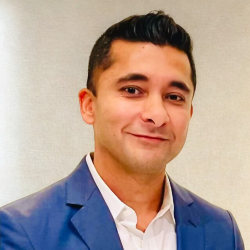Themes of the benefits of strong teamwork, enhanced communications, and strategic community building for all stakeholders in the clinical research enterprise—especially staff at study sites and the patients they serve—permeated the closing day of ACRP 2024 in Anaheim, Calif., on Monday (May 6).
“It’s going to take a village to come together and fix” the barriers that matter most in the way of elevating the conduct of clinical trials, Catherine Gregor, MBA, CCRP, CCRC, Chief Clinical Trial Officer for Florence Healthcare, said as she kicked off a Signature Series panel on “We’re in This Together: Advancing Clinical Trials as a Team.”
The panel, moderated by Gregor, featured Noelle Gaskill, Head of Clinical Research Collaborations for Mirati Therapeutics; Erin Stackowitz, U.S. Innovation Lead in the Clinical Study Unit for Sanofi; Rick Fisher, Senior Vice President for Operations with Velocity Clinical Research; Bernadette Tosti, Head of Digital Trials Client Solutions for Flatiron; and Dr. Nancy Sacco, Vice President and Head of Clinical and Site Development Operations for SiteBridge Research Inc.
“In order to innovate” for better trials, “we have to start at the sites,” Gaskill said. “It’s my personal mission to get more [attendees from pharmaceutical firms to come to ACRP conferences], because when we sit down and listen to [attendees from sites], that’s when progress happens.” Further, while sponsors are often risk-averse—as they have to be—they need to say, “it’s OK for sites to be innovative,” she added. If the industry really becomes site-centric, “that’s where the innovation will come from,” she predicted.
As sites go about being innovative, Stackowitz urged that they constantly ask themself, “‘Am I doing the right thing?’ and then refine, refine, refine.”
Applying lessons learned about how trials could be modified and successfully deployed even under such stressful conditions as during the pandemic will allow the clinical research industry to take the best innovations forward, noted Sacco. It’s a matter of shifting one’s perspective from “we can’t do that” to “what can we do” to “we can do that,” she suggested, keeping in mind that “change isn’t going to be a one-size-fits-all” situation.
“A lot of it is breaking down barriers” between sites and sponsors by shifting relationships “from tactical to strategic,” said Fisher, and trusting each other to perform their roles with professionalism. “We have to be able to work together across different functions of the industry to take risks and move forward together.”
Also, “We have to start challenging our assumptions about what a good site looks like” and get more unrelated sites to cooperate with each other when they can, said Tosti, utilizing the “a rising tide lifts all boats” metaphor. “[If] we can look across all therapeutic areas [and] all types of sites [and partner together], we can really make this work.”
Later on Monday, among other sessions echoing with messages of diversity, inclusivity, and workforce competencies and resilience in the clinical research arena, two speakers on “The Power of Coordinator Communication for Better Trials” said that while in-person investigator meetings at the launch of trials seem to be going the way of the dodo, keeping study coordinators in touch with each other across complex trials boosts the professionalism of the entire process.
Teri Crumb, MSN, CCRC, Project Manager for the Pediatric Nephrology Research Consortium, and Margaret Kamel, PhD, Director of Research Projects for the Division of Pediatric Nephrology at Emory University, discussed how moving a project forward requires open communication and clear expectations, which both come from places of respect to build upon a sense of inclusion and trust, eventually reaching a point of shared decision-making and the ability to complete important tasks in a state of self-awareness.
“As a young coordinator, [investigator meetings] were where I got my training [for a study],” Crumb said, reminiscing about days that may never return as the industry evolves. “I had one-on-one time with my [principal investigator]. …I could ask about strategy. Uninterrupted time with him [like that] was gold.”
“Coordinators are literally the face of your clinical trial on the front line of engaging participants, [and they] deserve more recognition and support,” Kamel said, advocating for in-person meetings because they allow for more collaborative participation, teamwork-based thinking, active and engaged discussions, new and strengthened relationships, and limited distractions.
Author: Gary Cramer



